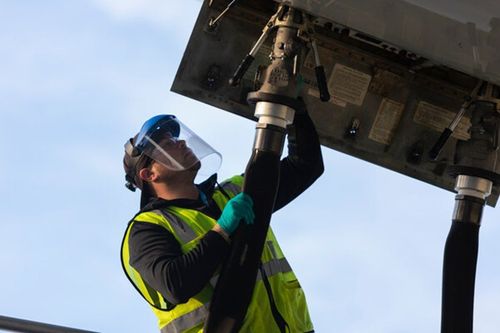Boeing makes its largest purchase of blended SAF

SOURCE: Boeing
April 16, 2024
BY Boeing
Boeing is buying 9.4 million gallons (35.6 million liters) of blended sustainable aviation fuel (SAF) to support its 2024 U.S. commercial operations, reducing its carbon emissions and working to help grow the supply of the fuel globally. This is the company's largest annual SAF purchase, more than 60% higher than its buy in 2023.
The blended fuel – 30% SAF made from waste by-products such as fats, oils, and greases and 70% conventional jet fuel – will support the Boeing ecoDemonstrator program and Boeing U.S. commercial operational flights.
Advertisement
"As our focus remains on safety and quality, sustainability continues to be a priority," said Ryan Faucett, vice president of environmental sustainability at Boeing. "Sustainable aviation fuel is essential to decarbonize aviation. About 20% of our fuel usage is a SAF blend, and we continue to increase our use of this fuel to encourage growth in the SAF industry. We are also working to make SAF more available and affordable to our commercial airline customers through collaboration, investment, research and policy development."
Unblended, or "neat" SAF, can reduce carbon emissions up to 85% over the fuel's life cycle and offers the commercial aviation industry's greatest potential to reduce its climate impact over the next 30 years.
Boeing will receive 4 million gallons of the blended SAF into its fuel farms in the Pacific Northwest. EPIC Fuels, a Signature Aviation company, will supply 2.5 million gallons from Neste, and Avfuel will provide 1.5 million gallons of blended SAF from Neste.
Advertisement
Boeing will also purchase the CO2 emissions reduction associated with 5.4 million gallons of blended SAF through an accounting process called book-and-claim. Book-and-claim is when a company purchases SAF certificates to displace conventional jet fuel. Instead of putting the fuel into a Boeing fuel farm, distributors will deliver it to nearby airports for use by airlines and other carriers.
Through Boeing's book-and-claim purchases, EPIC Fuels will supply 3.5 million gallons of blended SAF made by Neste, while World Fuel Services, a World Kinect company, will supply 1.9 million gallons from World Energy.
Related Stories
President Trump on July 4 signed the “One Big Beautiful Bill Act.” The legislation extends and updates the 45Z credit and revives a tax credit benefiting small biodiesel producers but repeals several other bioenergy-related tax incentives.
SAF Magazine and the Commercial Aviation Alternative Fuels Initiative announced the preliminary agenda for the North American SAF Conference and Expo, being held Sept. 22-24 at the Minneapolis Convention Center in Minneapolis, Minnesota.
Saipem has been awarded an EPC contract by Enilive for the expansion of the company’s biorefinery in Porto Marghera, near Venice. The project will boost total nameplate capacity and enable the production of SAF.
Global digital shipbuilder Incat Crowther announced on June 11 the company has been commissioned by Los Angeles operator Catalina Express to design a new low-emission, renewable diesel-powered passenger ferry.
International Air Transport Association has announced the release of the Sustainable Aviation Fuel (SAF) Matchmaker platform, to facilitate SAF procurement between airlines and SAF producers by matching requests for SAF supply with offers.
Upcoming Events










